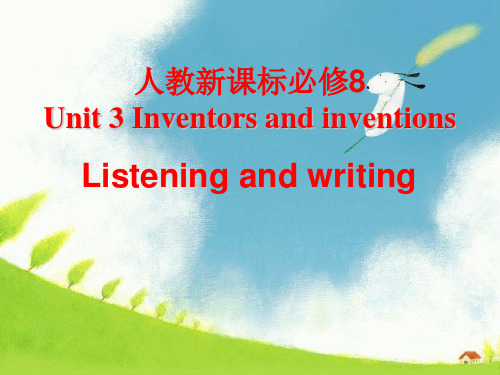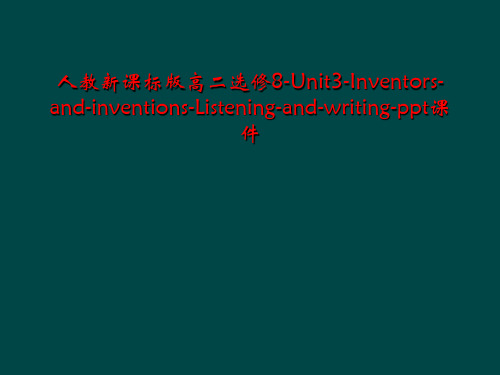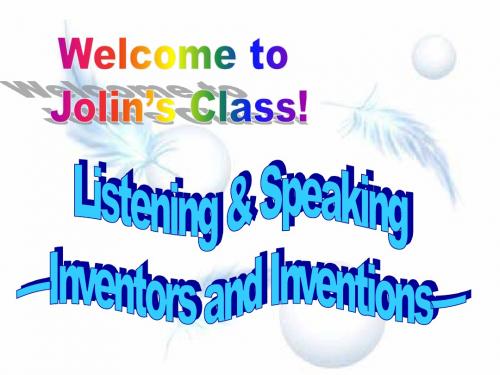人教课标版高中英语选修8Unit3Listening and Speaking(共22张PPT)
- 格式:pptx
- 大小:596.74 KB
- 文档页数:22


Unit 3 Inventors and InventionsListening , speaking and Writing---教案Teaching Goals:1.To develop Ss’ speaking and writing ability.2.To enable Ss to use the expression to make a phone.3. To enable Ss to write a letter applying for a position.Teaching Procedures:Step 1. Listening and speaking (2) (Using Language)1. Do some preparations for Writing. Teacher may say, “Do you remember the expressions related to making telephone?”2. Do more preparations for Writing. Teacher may say, “ Do you remember the expressions related to answering teleph one?”3. Get Ss to form groups of three to practise speaking. One is a receptionist, another an engineer, and the third a student.situation: A student wants to apply for a job in James Dyson`s pany. So he rings up one of engineers to ask what kind of person he needs and the engineer answers the questions honestly Step 2. Writing (Using Language)1. Ask Ss to discuss the following question in groups of four.Suppose you are going to apply for a job in a pany, what skills will you tell the interviewer to qualify you?2. Get Ss to write to James Dyson and begin the letter with the address and the date.The beginning and the ending of the letter:3. Get Ss to know what they should pay attention to.(1)Use the list of skills to make new paragraphs in your letter.(2) For each skill set down any experience you have had, which shows that you are a suitable person. You may be creative in this part of the letter.(3) Finish the letter by mentioning again the skills that you have.(4) End the letter.4. Get Ss to write the letter and exchange their articles and correct the mistakes. They are expected to assess the writing. First , students are supposed to give a general mark with their general impression of the writing. Then they are expected to assess the writing in the three aspects, content language, and organization. Ss have to correct the mistakes or point out the mistakes by underlining the words, phrase or sentences with"_____".Students are also expected to underline the beautiful words, phrases or sentences with “_______”. After the asses sment, the groups will discuss how to correct the mistakes.5. The writings with the high levels will be shown on the projector so that the whole class can appreciate them.Step 3. Homework1.Ask Ss to sum up what has been learned in this unit.Ask Ss to preview the next unit.。




选修八听力材料Unit1 A holiday in California A holiday in California George (G ) is on holiday in the United States 。
He is touring around California 。
Listen to him phoning home to talk to his friend Christie (C)。
C : Hello. G : Hi, Christie. It's me , George. C : Gosh , George ! Where are you? G: In Joshua Tree national Park 。
C: Wow, where is that? G: It’s in southeastern California. C: Lucky you! What are you doing down there? G : Well, I started in northern California and I’ve been traveling south. C : Cool 。
So how’s t he trip been ? G : Jolly good 。
There is so much to see and it ’s nothing like what I imagined. C: Really ? G: Yeah. I expected everyone to live near the beach in big houses , and I thought everyone here would be rich. C : (laughing ) Just as I thought. You've watched too many American movies ! G : I know, and they can give you the wrong idea! C: So , tell me, what's it really like? G : Well, some people live near the coast ; but further east, in the central part, is a huge valley where they grow all sorts of things like cotton , vegetables , nuts and fruit, oh , lots of things 。
Unit3 Listening 精品教案Teaching goals 教学目标1. Target language目标语言a. 词汇和短语refrigerator, court, version, hang on, out of order, get through, ring back, ring offb. 重点句子Hang on, please.I’m sorry, but this phone is out of order.I can’t get through.I must ring off now because...Can I ring back later?2. Ability goals能力目标Enable the students to listen to the description of mobile phones and make a telephone interview.3. Learning ability goals学能目标Help the students learn how to listen to the description of mobile phones and make a telephone interview.Teaching important points 教学重点Listen to the description of mobile phones.Teaching difficult points 教学难点How to make a telephone interview.Teaching methods 教学方法Listening and cooperative learning.Teaching aids 教具准备A recorder.Teaching procedures & ways 教学过程与方式Step Ⅰ Revision and lead-inGreet the students as usual.Talk about the applications of mobiles.T: Telephone is really a great invention in human history. With it, we can talk withfriends, families or others far away from us. Suppose you want to apply for a job in James Dyson’s company in England. The quickest and cheapest way may be a telephone conversation. So you ring up one of his engineers to ask what kind of person he needs. Now work in pairs and make a telephone conversation with your partner. Remember to ask for as much information as you can. Of course, we have learned about how to make telephone calls in English-speaking countries. Who can give me some examples?S: I’ll try. When making a t elephone call, we often say: Hello! Is that... speaking? Yes, this is... Can I take a message? Wait a minute, please, and so on.T: But the following expressions may be of great help. Before listening, please read and learn them by heart.Show the following.Hold the line, please.Hang on, please.Just a moment, please.I’m sorry, but this phone is out of order.I can’t get through.I’ll ring him / her up again.I must ring off now because...T: Now, you may work with your partner and discuss about the questions and answers.A sample dialogue:(S-student; E-engineer)S: Hello! Is that James Dyson’s company?E: Yes, Who’s that?S: This is Li Ping. Is that the personnel manager?E: Just a moment, please. Sorry. He isn’t here right now. Can I take a message?S: No, thanks. Maybe I’ll ring him again some other time. By the way, May I ask you some questions?E: Sure, go ahead.S: I want to apply for a job in your company and I want to ask what kind of person you need.E: Well, as far as I know, we need some skilled workers who are good at machinery and have a good knowledge of repairing some electrical equipment used at home, for example washing machine, refrigerator, electric fan and so on.S: Are we graduates needed in some departments in your company?E: It’s hard to say now. Maybe you will have some chance to work and learn in some department, but you have to wait and see. If you are free, you may call the personnel manager at three o’clock this afternoon.S: OK, I will. By the way, how much will I get if I can work as your colleague?E: Usually the average salary for newcomers is $2,000 per month. And you may get a rise if you progress well or have some invention in your work.S: Well, I know. I must ring off now because I have to go back home for lunch. Thanks a lot. Bye!E: Goodbye and good luck!T: Next please swap roles and answer your partner’s questions. Remember you must behave as if you are a member of Dyson’s company and answer the questions honestly.Step Ⅱ Listening and speakingT: Zhou Rui has decided to do a project on a living British inventor called James Dyson. So he telephoned Dyson’s company in England to interview one of its engineers about the great man’s ideas. Now listen to the conversation between them and finish the exercises on page 26. Before that, please look through the introductions first.Ask the students to finish the exercises after listening and then check the answers with them.T: While listening, you’d better make notes of the listening points like this:Show the following.The object of his invention:The problem of his invention:The improvement of his invention:Step Ⅲ LISTENING (Workbook)T: Millions of people in China and around the world use cellular phones. They are such great inventions —with a cell phone, you can talk to anyone on the planet from just about anywhere! These days, cell phones provide an unbelievable array of functions, and new ones are being added at a breakneck pace. Now look at the pictures and questions on page 62. Work in pairs and have a discussion about the three questions.Sample answers:S1: A mobile phone can now be used to receive phone calls, send and receive messages, listen to music, watch videos, surf the internet and so on. I find it very useful to use the mobile phones to make telephone calls and send and receive messages because we should always be informed and it’s important and necessary to communicate with each other in modern society. I also expect a mobile phone to show pictures of the person I call so that we can see clearly whether we are calling the right person and I hope one day we can use it to have meetings with people in the distance, and see films and show DVD in public.S2: Nowadays mobile phones can be used to do calculations, record pictures in life, play games, chat online, set time limit, wake up people, find out various information online and so on. I find they are very useful because we can enjoy ourselves when we use them to play games and chat online and talk with friends about different subjects.I expect mobile phones can be used one day to watch TV, cook meals, pick up foreign languages, do homework and take exams for me. Then I’ll be free from different kinds of worries and complaints and live a more comfortable and convenient life in the future.T: Goo d! You have known much about mobile phones and we’ll listen to some other functions of them, which you might feel more interested in. Now, listen and do Part 2 and then answer the questions in Part 3. While listening, please make notes as follows. OK?Show the following.The mobile Mary will buy:The extra applications of mobiles:The extra application of the 3-G mobiles:The reason why Mary is worried:The advantages of the 3-G mobiles:What might go wrong?Then check the answers with the students.Step Ⅳ LISTENING TASK (Workbook)Deal with the LISTENING TASK on page 67.T: First look at the three pictures on page 67 and discuss what inventions they might be. Any opinions?S: It looks as if it is a kind of machine moving on wheels and it can move very fast driven by a certain kind of force.T: It’s another invention by Leonardo da Vinci. Now, listen to the tape and decide if you agree with the people on the tape. What do you think it was? Fill in the chart below with the ideas of the two girls and make your own suggestions. Now please listen to the tape and fill in the chart on page 67. Make some notes while listening as follows.Show the following.Listening points:The girls’ suggestions:Reasons for:Reasons against:My suggestion:Then check the answers.Step Ⅴ HomeworkT: Boys and girls, today we have listened to some materials about different inventions and their functions and applications. I do hope you can listen to the materials again after class so that you can get very familiar with them. Besides, please finish the USING WORDS AND EXPRESSIONS on pages 63-64 and then preview theReading. Here are two questions for you.1. What is the problem talked about in the text?2. How did the writer solve the problem? List some of the steps.。
Unit3 听说课名师教学设计新课标选修八Unit 3 Inventors and InventionsUsing language Ⅱ教学设计一、教学内容分析本单元的话题是“发明家和发明”,“Using language”部分,涉及Listening,Speaking 和Writing 三个部分。
本课尝试如何将听力、口语和写作有机融合,培养学生核心素养,促进终身学习。
笔者对教材进行了必要的改动。
Listening(关于英国当今发明家James Dyson的故事)保留原样,原有的Speaking部分是打电话询问Dyson公司的会招聘什么样的人才,Writing 部分是给James Dyson写一封求职信。
教师认为这两部分的内容脱离学生实际,尤其是写作部分的求职信,高三学生鲜有相关的工作经验,因此缺乏实际可写的内容。
笔者将Speaking 部分改为“生活中的小发明”,Writing部分改为“为小发明写一封推荐信。
本节课以青少年科技创新大赛为主题背景。
由内容主线--Listening、Speaking和Writing串联。
每个部分都紧紧围绕Problem----Solution----Advantages展开活动。
整个课堂设计优化合作学习,增加学生听说读写各方面语言操练的机会,最后以推荐“one of your practical inventions”进行语篇输出。
二、学情分析我校本届高三学生的英语学习状况良好,在此之前他们已经有过关于发明和发明家的内容学习,了解一些相关的内容和背景知识。
在全国青少年创新科技大赛(CASTIC)的推动下,我校学生耳濡目染,创新意识和实践精神得到培养,科学精神有所提高。
但是,学生可能在表述一个发明所解决的问题、方法和优点等方面存在困难。
因此,教师在设计语言实践活动时,要关注学生的生活经验和认知水平,设计由浅入深、由易到难的活动,激发学生参与和体验的兴趣,鼓励学生积极表达个人观点,在发展语言技能的同时,提高分析解决问题与创新的能力。